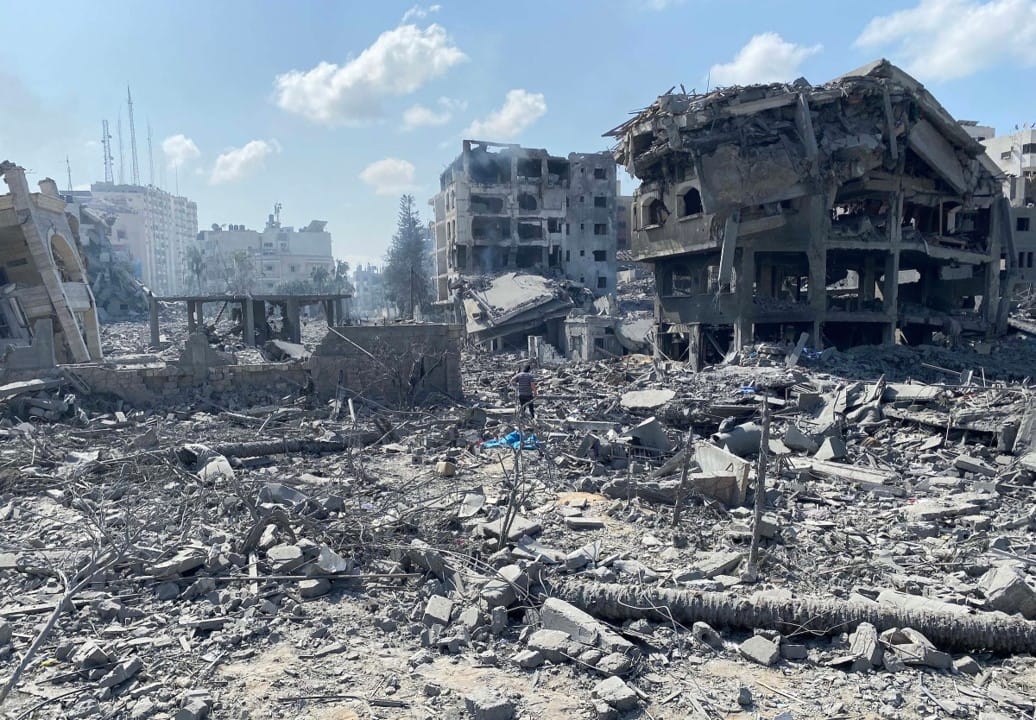Symbolism is not enough
The UN Security Council’s first call for an immediate ceasefire is little more than a nod.

It’s been just over a month since Christopher Lockyear, Secretary General of Médecins Sans Frontières, gave a briefing to the United Nations Security Council (UNSC) about the situation in Gaza. In practice it was less a briefing than an exhortation for some – any – meaningful opposition to the brutality he and his colleagues were witnessing. “Meeting after meeting, resolution after resolution, this body has failed to effectively address this conflict,” he told member states. “We have watched members of this Council deliberate and delay while civilians die.”
Those still looking to the UNSC to exert real pressure on Israel should’ve been sceptical then, if not sooner. This week, however, the Council was seen to finally take some action. After five vetoed drafts, nearly six months, and 32,000 Palestinian deaths, the council adopted its first resolution calling for an immediate ceasefire in the Gaza Strip.
Fourteen of fifteen members voted in favour of the resolution. The US abstained. The ceasefire in question would only last two weeks, until the end of Ramadan on 9 April, but the impression among some commentators was that it could open the way for bigger decisions to be made at other international institutions like the International Court of Justice and the European Union.
In practice, the resolution’s primary effect so far seems to be signalling a widening rift between Benjamin Netanyahu and Joe Biden. Abstention is a shift in previous US policy towards Israel’s actions, and one to which Netanyahu reacted by cancelling a trip to Washington by an Israeli delegation (despite the US informing Israel about its abstention ahead of time, a fact that’s led some to speculate the move was “theatre” more than feeling).
Tension between the two reportedly rose further following the collapse of a potential hostage deal; Israel blamed the US abstention, saying it had fuelled hopes in Hamas that a ceasefire could be achieved without hostages being released. US State Department spokesman Mathew Miller shot back by saying that Hamas’s rejection of the hostage deal was decided before the resolution passed and calling Israel’s statement “inaccurate in almost every respect”.
All this back-and-forth follows weeks of reports about Biden’s private “anger” at Netanyahu over the prospect of a ground invasion at Rafah. The real effect of this anger, however, remains to be seen. Also this week, the US Congress recommitted to its annual military aid package to Israel worth $3.8 billion, with another $14 billion pending, in a budget that also ceased funding to the United Nations Relief and Works Agency (or UNRWA, the primary agency for Palestinian refugees) following Israel’s allegations about the its ties to Hamas. And while Netanyahu cancelled one Israeli delegation to the US because of the resolution, Israeli Defence Minister Yoav Gallant was still in Washington to discuss a new round of arms sales this month.
Biden’s rhetorical cover for Israel’s bombardment hasn’t really stopped, either. Back in February, the president passed a memo requiring recipients of US military aid to provide ‘credible and reliable written assurances’ that that aid is being used in accordance with international law. In a press conference the day the UNSC resolution demanding a ceasefire was passed, Matthew Miller stated that the US had not found Israel “in violation of international law either when it comes to the conduct of the war or when it comes to the provision of humanitarian assistance,” according to the written assurances Israel had provided.
How, then, should we understand the US abstention in the light of continuing military and diplomatic support? Some commentators have suggested – convincingly – that it represents an effort by Biden to manage domestic criticism. With the public supportive of a permanent ceasefire, the Biden administration seems to consider its abstention a case of having its imperial cake and eating it, too. The fact that Palestinian lives are lost in the process appears to be a small inconvenience.
And where the US leads in cognitive dissonance, of course, the UK follows. The UK, which voted for the UNSC resolution, has licensed arms sales worth over £574 million to Israel since 2008 and shows no signs of letting up. A recent UN investigation reportedly found that a jet with parts made in the UK was likely responsible for the January bombing of a group of doctors in Gaza. That investigation is cited in a letter written by Labour MP Zarah Sultana this week and signed by 130 other MPs and peers calling for arms sales to Israel to be halted. (In response, ministers have reportedly insisted that arms sales decisions are all terribly complex – in apparent contradiction to UNRWA funding, which could be cut off with ease.)
In this, both the US and the UK seem more concerned with the politics of symbolism than in preventing the violence being suffered by those in the Gaza Strip on a daily basis. Without material consequences for the governments with which they claim to be “angry”, the passage of the UNSC resolution represents only a nod to burgeoning public frustration alongside a green light to Israel to continue its assault. The best evidence of that is Matthew Miller’s insistence that the new resolution is not legally binding, even as UN officials, international law experts, and other Security Council member states disagree.
Miller’s intervention here in Israel’s interest is particularly poignant given that Israel, for its part, has shown no intention of complying with the resolution, binding or otherwise, even for the two weeks it applies. In this, the state has form – it also didn’t comply with a 2016 resolution calling for a stop to illegal West Bank settlements, and now settlers are eyeing up plots on the Gaza waterfront.
To call the passage of the UNSC resolution primarily “symbolic” in the face of this violence isn’t meant to be an insult – certainly not to the millions of demonstrators who have spent the last six months shouting the word ‘ceasefire’ until they’re hoarse, and certainly not to those demanding it from the ground in the Strip, whether residents sheltering with their families or aid workers and medics trying to help them. In situations of despair, symbols are important. But we should never let ourselves be convinced they’re enough.
Alongside the news about the resolution, this week also saw Francesca Albanese, the UN’s special rapporteur on human rights in the Occupied Palestinian Territories, issue a new report titled Anatomy of a Genocide. Its conclusion is clear: “there are reasonable grounds to believe that the threshold indicating the commission of the crime of genocide against Palestinians as a group in Gaza has been met”. The violence documented in its pages is all too literal. Against it, symbolic gestures and nods to private anger come up far too short. ▼
Francesca Newton is a writer and editor at Vashti.
This is the first of a new edition of Pickles looking at recent domestic and international news stories from a Jewish leftist perspective. Subscribe to get the Pickle in your inbox every Friday.
Author

Francesca Newton is assistant editor at Tribune and an editor at Vashti. She currently lives in Melbourne.
Sign up for The Pickle and New, From Vashti.
Stay up to date with Vashti.



